True quartzite stone and radon?
carol08
13 years ago
Featured Answer
Sort by:Oldest
Comments (23)
plllog
13 years agocarol08
13 years agoRelated Discussions
Do Granite Countertops Emit Radon?
Comments (6)"Personal injury lawyers are already advertising on the Web for clients who think they may have been injured by countertops." I don't know why that made me laugh, but it did. I'm telling DH that it's way too dangerous for me to be in the kitchen....See MoreRadon & Granite Article in today's NY Times
Comments (42)This is a cut and paste, so I hope Al does not get too upset. We did make mention of is name so that should make him very happy. When marketing a product, one expects a bit of hype. The idea is to show that the product is the best over the competitor's line of product. That is the trade of advertisers and the history of marketing. Some tactics used to sell can be humorous or as serious as the competition between manufacturers. Marketing tactics that play on fears of the general public can be a very powerful tool. In the present day, there's a very popular angle of "green." This is prevalent everywhere in the media. So what happens when you mix a scare tactic under the guise of environmental concern? Buildclean found the answer to that question. The premise seems of the nonprofit organization seems to be admirable but the fact that the "awareness campaign" that Buildclean is currently using seems to be curiously slanted. In fact, the target seems to be the natural stone industry. When Sara Selber of BuildClean was asked how she got involved in natural stone and radon, she explained how she was approached by the owner of C&C North America, a company that produces two products granite and a quartz product called Silestone®. "C&C North America then recruited a quartz company called Cambria, after they learned quartz was an issue, she further explained that the two companies hired her to test quartz, granite and other surfaces for radon emission. Both companies are testing their products through BuildClean, and they contracted two labs one in New York and one in Israel. We have looked all over the C&C website but cannot find any mention of natural stone. When ask what granites emit radon, Sara Selber said; "Not all granites emit radon or radiation. There are some that clearly do. There are some that absolutely don't. We don't know," she said. They're being set up as a non-profit, and they're funded with two large donations. The first is $250,000 from the makers of 'Silestone.' They manufacture quartz countertops, which is a direct competitor to granite. Silestone finance records show that they started out in April of 1998 with a an initial investment of $410K, made there first million in 1998, sales in 2002 was over $70M, and sales in 2006 was well over $260M. it is not hard to see that they have the money to invest $250,000 in a new advertising campaign. BuildClean is also getting money from Cambria, another quartz manufacturer. In fact, Cambria's marketing director is on BuildClean's board of directors. When asked about the funding Sara responds: I don't believe the issue is who our founders are. And I'm not going to have that debate." That answer seems to be clear enough. In a recent interview Mrs. Selber mentions teaming up with Al Gerhart who has some interest in the granite \radon scare. Al Gerhart is a carpenter whohappens to own a website called the Solid Surface Alliance .org. He educated himself, regarding materials he works with that may expose him to harmful elements." Upon further review it seems this "personality" is well known for his view of natural stone. All one has to do is look at the website to get the gist of his viewpoint. Coincidentally, there also seems to be a new business venture for Solid Surface Alliance as the website now sells Geiger counters to detect radiation His debates have earned him quite a place online in forums discussing the subject. After a certain debate on a well known residential forum, a renowned geoscientist in the industry concluded: "Al attempts to hijack debates by choking the system with verbal diarrhea. The problem appears to be that he has a bit of knowledge about some things but not enough sense and understanding of the subjects. In that debate on the Garden Forum he threw in so many fabrications (plain made up lies) that his credibility just plummeted to zero. Anyone who operates this way (by including a number of facts to gain an element of credibility in the eyes of a generally uninformed audience, twisting facts deliberately or because of his lack of understanding, and then throwing in a number of lies) does not deserve extended airtime. Many years ago when doing science psychology I still remember my professor giving the advice to his students that you should never engage a nutter in debate. You can never win an argument with such people. I recognized this early in the forum and that is why I would not engage him in "debate". One of his major problems is that he does not know what the numbers mean and how they are derived." In response to the buildclean tactics, The Marble Institute of America is in the process of doing their own independent study: "The Marble Institute of America (MIA) is grateful for the preliminary response from the members to the newly established Truth About Granite Fund. Based on this positive response, it's clear that their colleagues share their commitment to protect consumers from needless fear mongering by establishing standards for the testing of granite so consumers can safely and comfortably enjoy the beauty, durability and practicality of this natural stone." When we asked the MIA why Sara Speer Selber consider The Truth About Granite Fund as a draconian move that is being waged against BuildClean(TM), they simple responded: "The Truth About Granite Fund was established to help raise funds to develop unbiased, scientific standards for the granite industry, including the testing of granite for radon. No such standards currently exist in the natural stone industry. Previous tests of granite samples have found they are safe. However, the Truth in Granite Fund aims to take advantage of new, advanced scientific instruments that make testing both more practical and more accurate. Our goal is to make sure testing follows consistent protocols, so that future studies are meaningful and based on consistent, approved science not isolated methodologies or unapproved instruments. Ultimately, our goal is to make sure the granite we sell is safe." This latest sales tactic received the attention of an independent group called the Natural Stone Restoration Alliance (NSRA). The NSRA saw Radon testing as an added service that their members could provide to the homeowners along with all their other services for natural stone. Josveek Huligar, one of the lead testers and trainer for the NSRA , invited times Members of the Solid Surface Alliance dot org to discuss and provide proof of this threat to the home owners. The Solid Surface Alliance dot org agreed to provide an alleged radiation producing granite sample that they claim to have in their possession to do independent testing. After an initial agreement between the two groups it seems the Solid Surface Alliance dot org has reneged on the delivery of the alleged material. Mr Huligar was disappointed of the outcome. The NSRA than requested the name of the company that Mr. Gerhart claimed to just have rejected over 10k worth of radon producing granite. When the information was not provided, Huligar ask if he could purchase the next slab that Mr. Gerhart rejected. But for some reason Mr. Gerhart could no longer find a sample for testing. Mr. Huligar went on to say: "All we care about at this point. As for whether are not Stone adds a measurable amount of "radon" in a home, Mr. Gerhart had agreed to come to NY and pick out a hot slab that I would place in my own home after testing my home for radon. Once the granite was installed I would test my home again as described by the EPA and have it tested by someone approved by the EPA. Not only would we do the short and long term test, we would also video tape the whole event, the selection, the creation, the install, and than setting up cameras for anyone to view the stone and meters on the net. I was looking forward to do this, but at this time it appears that Mr. Gerhart has no plans on doing as he said which is a big disappointment." The NSRA plans to push for this simple test, they feel that the consumers only care about one thing; "whether or not adding granite in your home would significantly change the radon levels in a home". At present, the most prudent consumer should watch the outcome of this debate and make an informed decision, not taken in by a scare tactic by advertisers. EPA Confirms That Granite Countertops Pose No Significant Health Risk http://nsraweb.com/index.php/Latest/EPA_Confirms_That_Granite_Countertops_Pose_No_Significant_Health_Risk.html...See MoreRadon -- it's simply a consumer protection issue
Comments (14)After digging through so many of these threads silently, I have finally lost my marble and my template as well. I feel I have grounds to be quarryelsome and point out that the debate is not complete because a slate of famous literary figures and celebrities have yet to fabricate their counter responses: Spanish Literary figure: RaDon Quixote Michael Corleone's ill-fated cousin: Godfather RaDon Corleone Sally Field's pro-union alter ego: Norma Raedon Richard Dean Anderson's action alter ego: McGeiger The whole cast and crew of: "Everybody Loves Raydon 60's Commedian Tommy Chong's daughter and actress: Rae-Don Chong Cook show and talk show host: Rachael Raydon Popular singer: Corinne Bailey Raedon Voiceover Master: RaDon LaFontaine Miami Vice and Nash Bridges star: RaDon Johnson and... Mullet wearing "Achy Breaky Heart" singer: Billy Raedon Cyrus (should've seen that coming a "Miley" away) OgeeWiz! There are shards and shards of others, but I will get off of my soapstone box and hope that I have not been taken for granite. Feel free to respond and let me know if I am an ingneous neographite who is full of schist and has made you feel chiseled, but I ask you to bury your hatchets and forgive my full quartz press of verbal feldsparring as I have done this to help everyone remember, "A mine is a terrible thing to waste."...See MoreTested Quartzite. Passed EXCEPT stone darkens ...
Comments (6)I am doubting quartzite's ability as a countertop. Complaint after complaint after complaint about catastrophic edge bleed and other mishaps. Head over to www.stonefabricatorsalliance.com and hear 6 different complaints over three pages. Never, ever, heard this crap about Corian....See Morechris45ny
13 years agocarol08
13 years agobickybee
13 years agocarol08
13 years agoKati
13 years agobill_vincent
13 years agocarol08
13 years agobill_vincent
13 years agocarol08
13 years agoCloud Swift
13 years agocarol08
13 years agocarol08
13 years agocarol08
13 years agocarol08
13 years agoBuehl
13 years agobrickeyee
13 years agocarol08
13 years agobrickeyee
13 years agocarol08
13 years agoKathleen Deuel
8 years ago
Related Stories

KITCHEN COUNTERTOPSKitchen Counters: Quartzite Offers Strength and Beauty
Eye-catching patterns and a natural pedigree make durable quartzite a popular alternative to granite and marble
Full Story
BATHROOM DESIGNBathroom Workbook: 7 Natural Stones With Enduring Beauty
Not everyone wants a marble bath. Bring organic warmth to counters, walls or floors with these hard-wearing alternatives
Full Story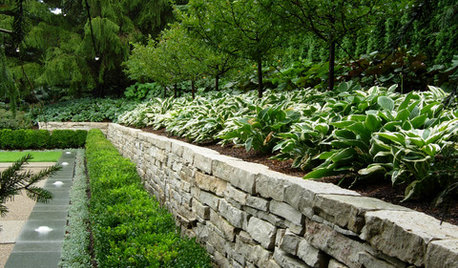
LANDSCAPE DESIGNGarden Walls: Dry-Stacked Stone Walls Keep Their Place in the Garden
See an ancient building technique that’s held stone walls together without mortar for centuries
Full Story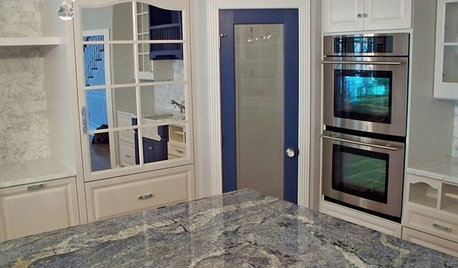
KITCHEN COUNTERTOPSKitchen Counters: Granite, Still a Go-to Surface Choice
Every slab of this natural stone is one of a kind — but there are things to watch for while you're admiring its unique beauty
Full Story
KITCHEN DESIGNAlternatives to Granite Countertops, Part II
Still looking for a new kind of countertop? Try sodalite, zinc, limestone, onyx and more
Full Story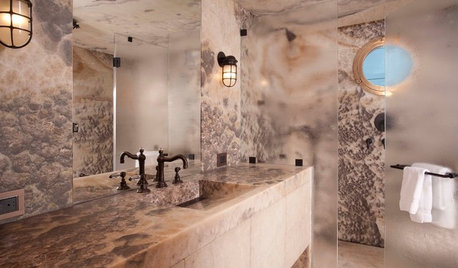
STONEGive In to Your Wild Side With Exotic Granite and Onyx
Go beyond the standard slab with these radiant and rare stones
Full Story
HOUSEKEEPINGHow to Clean Marble Countertops and Tile
Acidic solutions can damage your marble surfaces. Here’s how to keep marble looking clean and amazing
Full Story
KITCHEN DESIGNKitchen Counters: Elegant, Timeless Marble
Ever classic and with unrivaled beauty, marble countertops bespeak quiet luxury in the kitchen — with a few caveats
Full Story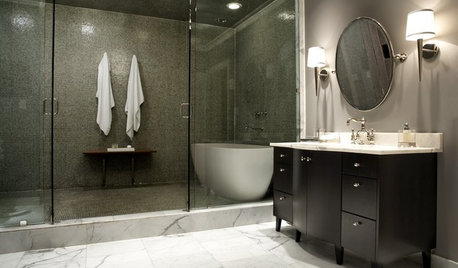
KITCHEN DESIGNUsing White Marble: Hot Debate Over a Classic Beauty
Do you love perfection or patina? Here's how to see if marble's right for you
Full Story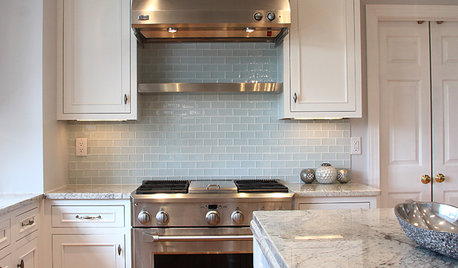
KITCHEN DESIGN5 Favorite Granites for Gorgeous Kitchen Countertops
See granite types from white to black in action, and learn which cabinet finishes and fixture materials pair best with each
Full Story



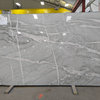
needsometips08